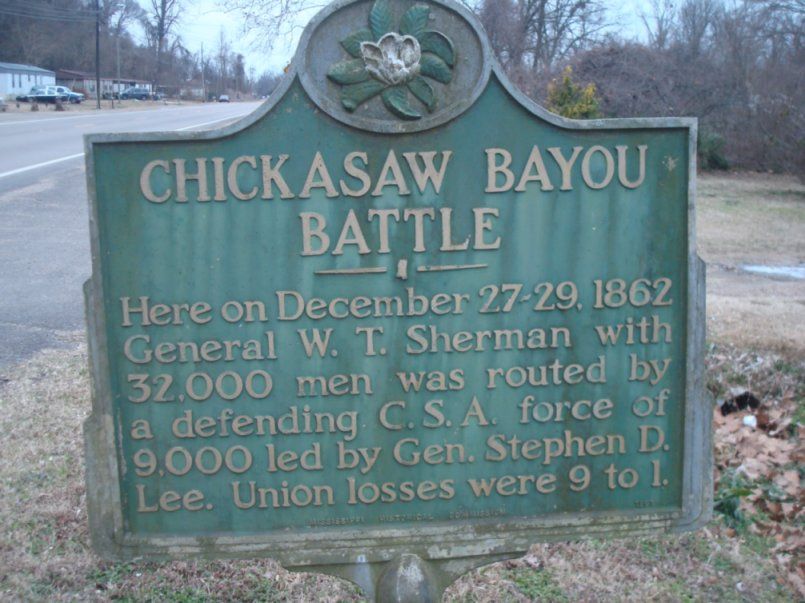| Previous Date | Day By Day Index | 16th OVI Home Page | Next Date |
Where was the regiment on
Tuesday, December 30, 1862
On this day the 16th Ohio arose in a cornfield along Chickasaw Bayou, Mississippi, and took stock of the horrible damage done to them the day before. The regiment of 730 lost 311, killed, wounded, captured or missing - 42% of their number.
Cpl. Theodore Wolbach, Company E, writes:
The next morning, the 30th, found the 16th lifting their chilled and benumbed bodies from a muddy bivouac in an old cornfield. When we were in ranks, in column of Companies, the havoc of the fight was painfully visible. One Company, (K,) had only fifteen men present all told. Some of the Companies had no officers. While we were standing here in ranks, there approached us from the direction of the river, a mounted officer that we were all familiar with. It was our new Major, R. W. P. Muse, who had been back on the boat sick (?). He was splendidly mounted with all the gay trappings belonging to his rank. He rode to the front of the regiment with the evident intention of taking command. His appearance was splendid and knightly and he possibly would have filled his new office well had not DeCourcey, who was near by, rode up and ordered him in tones severe and sharp, to 'report back to the boat.' Muse obeyed and soon after resigned by reason of ill health.
DeCourcey moved us up to the front again, but we took no active part in the skirmishing that was kept up. Though we were as well protected from the rebel fire as the nature of the locality permitted, some of our men were wounded. An attempt to secure a suspension of hostilities for the purpose of removing the dead, and any of the wounded that might be on the field, was unsuccessful. Some of our boys built fires and done some cooking. It was a little risky particularly when a rebel shell rooted up the soft earth close by. Two Germans, of the 22d Ky., were making coffee in a camp kettle when a shell struck scarcely a rod away and threw a small cart load of dirt over the neighborhood. They lifted themselves and the kettle from there in short order.
It was a very unpleasant sight for us to look over toward the rebel works and see our dead with nothing remaining on them but their underclothing; and it was aggravating to know that the rebel commander would not allow a truce to enable us to remove and bury our comrades.
General Sherman was busy devising a second attack. He consulted with Admiral David Porter, whose fleet had carried Sherman's forces to Chickasaw Bayou and who had the responsibility of protecting the Yazoo and Mississippi rivers with his gunboats. Sherman and Porter decided they could move a large force further up the Yazoo at night and make a surprise attack at Synder's Bluff along Skillet Goliah bayou. Sherman would leave significant forces where they currently were, facing Walnut Hills, and at the appointed time, have them engage the rebels as a distraction while the main attack occurred further east at Snyder's Bluff. The bad weather of the week continued. Fog kept Admiral Porter delayed for a full day and the timing of the moon would then make the attackers obvious. Sherman also knew that the winter rains could soon flood the river valley and risk a disaster of epic proportions. Sherman also learned that Gen. Ulysses Grant had decided not to attack the Confederates from the north, leaving him and his force on their own. With all these risk factors, Sherman made the decision to evacuate his force from the Yazoo and regroup further up the Mississippi River at Milliken's Bend.
It is known that some or all of the 16th Ohio enlisted men who were taken prisoners were confined in Vicksburg for about a month before being transferred to a makeshift prison near Jackson, Mississippi. The prison was nothing more than a partially destroyed covered bridge in which 400 men were confined and suffered terribly.
* Information and italicized quotations above from a series of articles entitled Camp and Field - The Old 16th Ohio, written in the 1880s by Theodore Wolbach, late Corporal in Company E, 16th Ohio Volunteer Infantry.
Historic marker along road near Chickasaw Bayou, Mississippi

| Previous Date | Day By Day Index | 16th OVI Home Page | Next Date |